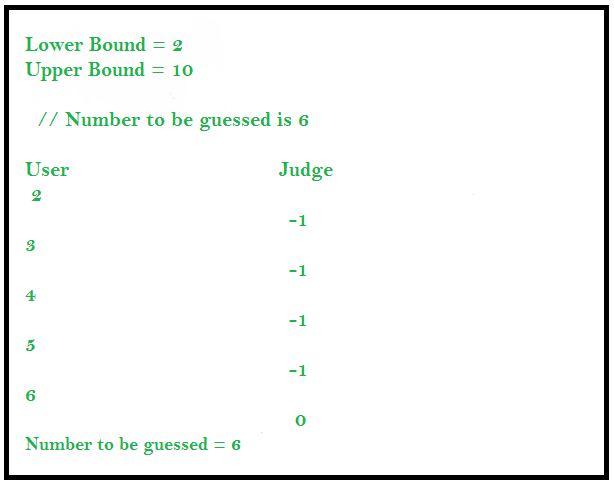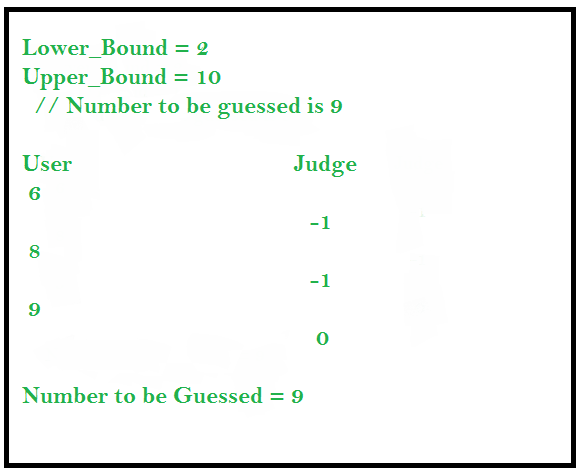Los Problemas Interactivos son aquellos problemas en los que nuestra solución o código interactúa con el juez en tiempo real. Cuando desarrollamos una solución para un problema interactivo, es posible que los datos de entrada proporcionados a nuestra solución no estén predeterminados, pero se construyen específicamente para ese problema. La solución realiza una serie de intercambios de datos con el juez y al final de la conversación el juez decide si nuestra solución fue correcta o no.
Adivinando el número (un problema interactivo)
En este problema el usuario tiene que adivinar el número durante una comunicación con el juez. Al usuario se le proporciona el límite superior e inferior y puede preguntarle al juez si un número es el número que debe adivinar. El juez responde con -1 si el número es menor que el número a adivinar o 1 si el número es mayor que el número a adivinar o 0 si es igual al número a adivinar.
Enfoque 1: adivinanzas lineales
El usuario puede consultar al juez por todos los números entre el límite inferior y el límite superior para encontrar la solución.

C++
#include <bits/stdc++.h>
using namespace std;
int main()
{
int lower_bound = 2;
int upper_bound = 10;
// Number to be guessed is 6
// Iterating from lower_bound to upper_bound
for (int i = lower_bound; i <= upper_bound; i++) {
cout << i << endl;
// Input the response from the judge
int response;
cin >> response;
if (response == 0) {
cout << "Number guessed is :" << i;
break;
}
}
return 0;
}
// This code is contributed by divyeshrabadiya07
Java
import java.util.*;
class GFG {
public static void main(String[] args)
{
Scanner sc1 = new Scanner(System.in);
int lower_bound = 2;
int upper_bound = 10;
// Number to be guessed is 6
// Iterating from lower_bound to upper_bound
for (int i = lower_bound; i <= upper_bound; i++) {
System.out.println(i);
// Input the response from the judge
int response = sc1.nextInt();
if (response == 0) {
System.out.println("Number guessed is :" + i);
break;
}
}
}
}
Python3
if __name__=='__main__':
lower_bound = 2;
upper_bound = 10;
# Number to be guessed is 6
# Iterating from lower_bound to upper_bound
for i in range(lower_bound, upper_bound + 1):
print(i)
# Input the response from the judge
response = int(input())
if (response == 0):
print("Number guessed is :", i, end = '')
break;
# This code is contributed by rutvik_56
C#
using System;
class GFG
{
public static void Main(string[] args)
{
int lower_bound = 2;
int upper_bound = 10;
// Number to be guessed is 6
// Iterating from lower_bound to upper_bound
for (int i = lower_bound; i <= upper_bound; i++)
{
Console.WriteLine(i);
// Input the response from the judge
int response = int.Parse(Console.ReadLine());
if (response == 0) {
Console.WriteLine("Number guessed is :" + i);
break;
}
}
}
}
// This code is contributed by Pratham76
2 Number guessed is :2
Complejidad de tiempo: O(n)
Enfoque 2: Aplicación de la búsqueda binaria
También podemos aplicar la búsqueda binaria de forma interactiva para encontrar la solución. Esta solución es eficiente en comparación con el enfoque anterior.

C++
#include <bits/stdc++.h>
using namespace std;
int main(int argc, char** argv)
{
int lower_bound = 2;
int upper_bound = 10;
while (lower_bound <= upper_bound)
{
int mid = (lower_bound + upper_bound) / 2;
cout << mid << endl;
int response;
cin >> response;
if (response == -1)
lower_bound = mid + 1;
else if (response == 1)
upper_bound = mid - 1;
else if (response == 0){
cout << "Number guessed is :" + to_string(mid) << endl;
break;
}
}
return 0;
}
// This code is contributed by geeky01adarsh
Java
import java.util.*;
class GFG {
public static void main(String[] args)
{
Scanner sc1 = new Scanner(System.in);
int lower_bound = 2;
int upper_bound = 10;
// Number to be guessed is 9
// Applying Binary Search interactively
while (lower_bound <= upper_bound) {
int mid = (lower_bound + upper_bound) / 2;
// Print the guessed number
System.out.println(mid);
// Input the response from the judge
int response = sc1.nextInt();
if (response == -1) {
lower_bound = mid + 1;
}
else if (response == 1) {
upper_bound = mid - 1;
}
else if (response == 0) {
System.out.println("Number guessed is :" + mid);
break;
}
}
}
}
C#
using System;
class GFG {
static void Main() {
int lower_bound = 2;
int upper_bound = 10;
// Number to be guessed is 9
// Applying Binary Search interactively
while (lower_bound <= upper_bound) {
int mid = (lower_bound + upper_bound) / 2;
// Print the guessed number
Console.WriteLine(mid);
// Input the response from the judge
int response = Convert.ToInt32(Console.ReadLine());
if (response == -1) {
lower_bound = mid + 1;
}
else if (response == 1) {
upper_bound = mid - 1;
}
else if (response == 0) {
Console.WriteLine("Number guessed is :" + mid);
break;
}
}
}
}
// This code is contributed by divyesh072019
Python3
lower_bound = 2
upper_bound = 10
# Number to be guessed is 9
# Applying Binary Search interactively
while (lower_bound <= upper_bound) :
mid = (lower_bound + upper_bound) // 2
# Print guessed number
print(mid)
# Input the response from the judge
response = int(input())
if (response == -1) :
lower_bound = mid + 1
elif (response == 1) :
upper_bound = mid - 1
elif (response == 0) :
print("Number guessed is :", mid)
break
6 Number guessed is :6
Complejidad del tiempo: Paradigma del algoritmo O(logn)
: divide y vencerás
Publicación traducida automáticamente
Artículo escrito por sauravprateek y traducido por Barcelona Geeks. The original can be accessed here. Licence: CCBY-SA